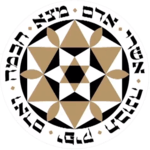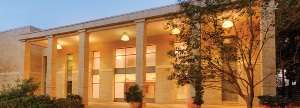Shalem College
Shalem College (Hebrew: המרכז האקדמי שלם, HaMerkaz HaAkademi Shalem) is Israel's first liberal arts college, located in Jerusalem, Israel. Founded in 2013, it aims to be Israel’s answer to America’s Ivy League universities, based on a core curriculum of humanities courses that are mandatory for each student, and around the idea of a vibrant, campus-focused student life.[3]
המרכז האקדמי שלם | |
 | |
| Type | Private Liberal arts |
|---|---|
| Established | 2013 |
| President | Isaiah Gafni |
| Vice-president | Daniel Gordis |
Academic staff | 48 |
| Students | 200 |
| Location | , |
| Campus | urban |
| Colors | Blackberry |
| Website | www.shalem.ac.il |
 | |
A privately funded, undergraduate-degree-granting institution, Shalem currently boasts 94 enrolled students. The college is accredited by the Council for Higher Education in Israel.
History, academia, and campus life

The Shalem Center, a think tank, founded (and dissolved to become) Shalem College in January 2013, following accreditation by the Council for Higher Education in Israel.[1][4] According to Daniel Gordis, the college's founding senior vice president, the idea was always for the center to provide the intellectual building blocks for a college with a strong humanities program, which Ivy League graduates in Israel, primarily from Princeton, had been hoping for since the late 1980s. The Center had translated classics such as Leviathan, by Thomas Hobbes, into Hebrew.[3]
The four-year degree program teaches a broad curriculum similar to those found in American liberal arts colleges. The college believes this contrasts with most universities in Israel, which it says were "founded by European immigrants and patterned on the classic German research university, [and] typically offer narrow training geared toward specific disciplines and careers."[5] The college seeks to challenge the conventional Israeli student work ethic, in which many students—who earn their bachelor's degrees after completing military service and study while they are employed—treat class attendance as optional. The college plans to use financial incentives to encourage students to be active in campus life, including incentives to live close to campus.[1] Every Tuesday, each student must fulfill mandatory community service, helping nearby Jewish and Arab neighbors.[3]
A private, undergraduate degree-granting institution, Shalem College has pioneered the use of required courses for all students alongside a choice of major concentrations. The centerpiece of the college’s academic community, the Core—which includes courses in philosophy, history, the natural and social sciences, literature, and the fine arts—is unique in its integration of the study of key Western and Jewish texts. The college follows the Great Books model, in which students are required to read sources directly, and in the context of small, participatory seminars. The core curriculum includes Plato, Aristotle, Hume, Shakespeare, Tolstoy, Durkheim and Einstein. Key texts from Jewish tradition are drawn from the Babylonian Talmud, Maimonides, Spinoza and the Dead Sea Scrolls. Sections of the Quran are also compulsory.[1] After their first year, students will choose one of the two opening majors: the Interdisciplinary Program in Philosophy and Jewish Thought (IPJ), or Middle East and Islamic Studies (MEIS).[6] Other majors in the fields of law, government and diplomacy, economics, and literature are planned to be added as the college matures.[5] The language of instruction is Hebrew, however, students are required to read extensively in English. Additionally, MEIS students are expected to learn Arabic and IPJ students interested in pursuing graduate study are expected to undertake study of an additional language, such as Greek or German.[5]
Students and faculty
The scholar of the Middle East Martin Kramer served as the college’s first president.[7] The Shalem Center had a reputation for being dominated by immigrants from the United States, but the college has reportedly "broke[n] out of the Anglo mold."[1] The staff and student rosters span the political and religious spectrum, and the college is not affiliated with the ideology of the former research center.[1][2] Although no Arabs enrolled the first year, the school has made extensive efforts to boost diversity and recruit students from the Arab sector.[3][5]
Shalem accepts candidates on the basis of exams, intellectual capabilities, and demonstrated commitment to public service. Accepted applicants receive substantial financial aid packages.[8]
Core Curriculum
In the college the Core Curriculum is required of all students, regardless of their major.[9] Students are required to read 72 classics works as part of the Core Curriculum.
Western & Eastern Philosophy and Religion
- Greek Philosophy
- Modern Philosophy
- Introduction to Islam
- Introduction to Christianity
- Foundations of Classical Indian Civilization
Jewish Thought
- The Hebrew Bible
- Rabbinic Literature
- Medieval Jewish Philosophy
- Contemporary Jewish and Zionist Thought
Literature, Art, and Music
- Western Literature I and II
- Hebrew Literature from Yehuda Leib Gordon to Nathan Alterman
- The Language of Music
- History of Art
- Expository and Academic Writing
- English Language
History and Social Sciences
- Applied Economics
- Philosophy of Economics
- Introduction to Social Sciences
- Western and Middle Eastern History I and II
- Israel and a Jewish and Democratic State
- Challenges and Schisms in Israeli Society
Mathematics and the Natural Sciences
- Statistics, Measurement, and Quantitative Reasoning
- Physics
- Biology
See also
- List of universities and colleges in Israel
References
- Nathan Jeffay (August 30, 2013). "First American-Style Liberal Arts College Opens Doors In Israel This Fall". The Forward.
- Melanie Lidman (January 13, 2013). "Israel accredits first liberal arts college". Jerusalem Post.
- Ilene Prusher (Oct 7, 2013). "From Moses to Machiavelli, Shalem College sets up shop as Israel's answer to the Ivy League". Haaretz.
- "New College Dedicated to the Humanities Opens in Jerusalem," Jerusalem Post, October 6, 2013.
- "Questions and Answers about Shalem College" (PDF). Shalem Center. Archived from the original (PDF) on 2013-08-31.
- "Shalem Center in Jerusalem Recognized as Academic Center," Israel HaYom, January 2, 2013.
- "Martin Kramer Chosen to Serve as Founding President of Shalem College," Jerusalem Post, October 13, 2009.
- Scholarship Information, Shalem College Website (Hebrew).
- http://shalem.ac.il/en/core-program/